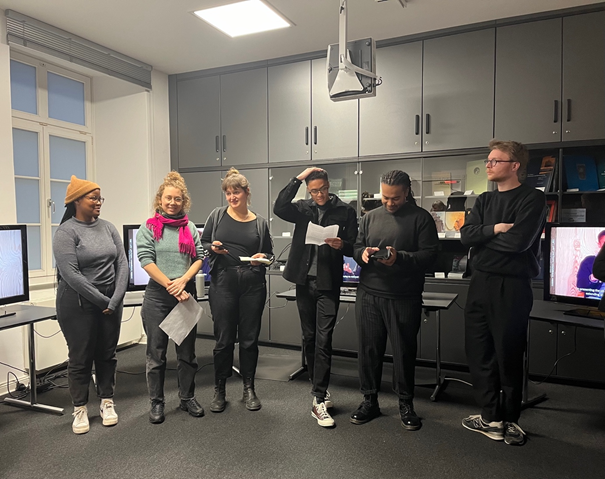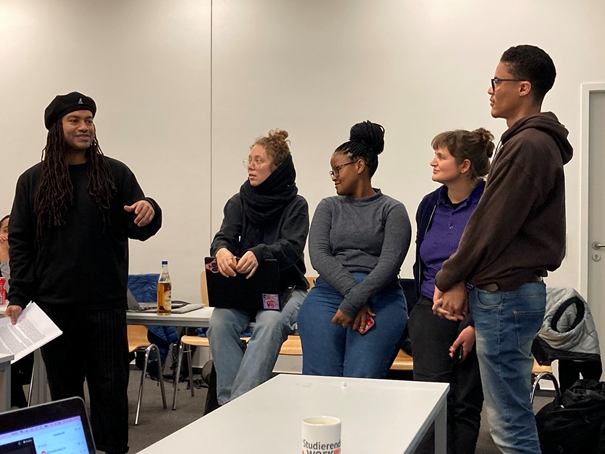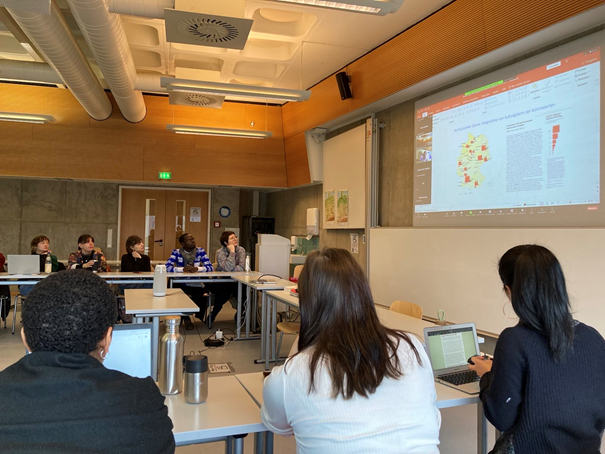Cooperation with the University of the Western Cape on Decentering the Museum and Postcolonial Politics of Memory – Visit of three doctoral students to Bremen
Between the end of November 2023 and mid-January 2024, PhD students Brent Abrahams, Vuyisanani Am and Dean E. Stephanus from the Department of Historical Studies at the University of the Western Cape in Cape Town were guests in Bremen at the invitation of the DFG Research Training Group 2686: Contradiction Studies – Constellations, Heuristics and Concepts of the Contradictory. The young researchers are part of the joint project “Decentering the Museum: Resist! – Repair! – Restitute! – Reimagine!” of the Department of Anthropology and Cultural Research at the University of Bremen (Prof. Dr. Michi Knecht), the Department of Social and Cultural Anthropology and the Department of Art History at the University of Cologne (Prof. Dr. Martin Zillinger and Dr. Anna Brus) and the African Program in Museum and Heritage Studies at the University of the Western Cape (Prof. Dr. Ciraj Rassool).
Within this framework, students from the three universities have been critically examining colonial collections and museum practices in German museums in online seminars and mutual study visits since the 2020 winter semester. In collaboration with filmmakers Britta von der Behrens and Sebastian Eschenbach, a smaller group of students have created the video installation re|despair – Painful Encounters in German Museums, which documents the difficulties of cooperative research from different positionalities as well as silence, shame, anger and grief in the face of epistemic violence. It asks: How can forms of knowledge be decentered in a politically heated debate? What does it “cost” – emotionally, individually, institutionally, politically – to make “unheard” voices heard in Germany? After the video installation was shown in May/June 2023 as part of the European Conference on African Studies at the Rautenstrauch-Joest-Museum in Cologne and in September 2023 at the Johannesburg Holocaust & Genocide Centre, the students presented it at the conference “The Elephant in the Room: Dealing with Bremen’s (post-) colonial past and present” on December 1, 2023 at the Haus der Wissenschaft in Bremen.

Presentation of the video installation re|despair at Haus der Wissenschaft, Bremen. © Amelie Greefe
The guests from the University of the Western Cape also attended the “Cologne Crossroads Conversation” on December 6, 2023 on the topic of “5 Years of Making and Debating Restitution” at the Rautenstrauch-Joest-Museum in Cologne. Prof. Dr. Bénédicte Savoy and Ciraj Rassool looked back on the efforts to come to terms with colonial injustice and a pluralization of knowledge as well as the resistance that has shaped the restitution debate since the publication of the restitution report by Savoy and Prof. Dr. Felwine Sarr in 2018. On December 7, the UWC guests presented their dissertation projects in a joint workshop with Helen Stephan at the Contradiction Studies Research Training Group. Under the title “Agencies, Contradictions, and Subjectivities. Towards a Material-Discursive Framing of Engaged Practices”, they discussed the contradictions in the relationship between academic research, theory, subjectivities and social practice.
As part of their visit to Bremen, the re|despair group also presented parts of their film installation in the seminar “Postcolonial Localizations of Transculturality” led by Prof. Dr. Rosa Cordillera A. Castillo and Michi Knecht within the Master’s program Transcultural Studies (MATS).

Presentation of the video installation re|despair in the seminar „Postcolonial Localizations of Transculturality“ within the MA Transcultural Studies at the University of Bremen. © Michi Knecht
The film clips and the subsequent discussion connected to the previous lectures by Dr. Richard Tsogang Fossi and Dr. Mikaél Assilkinga in an interesting way. They had spoken about their research findings on Cameroonian cultural heritage in German museums and collections, which are part of the anthology Atlas der Abwesenheit. Cameroon’s Cultural Heritage in Germany, published in 2023. This enabled the students to interrogate the fields of colonial theft of cultural heritage, museum practices, restitution and the decentering of knowledge from multiple perspectives.
Furthermore, for the UWC guests, the stay in Bremen presented an opportunity to exchange ideas with other young researchers at the colloquia of the Contradiction Studies Research Training Group and to continue their work on the re|despair project. The reflection on the different experiences and impressions in colonial institutions is ongoing and continues to raise new questions about continuities and the reproduction of epistemic violence as well as the possibilities of collaborative, polyphonic work.

Discussion with Dr. Richard Tsogang Fossi, Dr. Mikaél Assilkinga and students from the MA Transcultural Studies at University of Bremen. © Michi Knecht